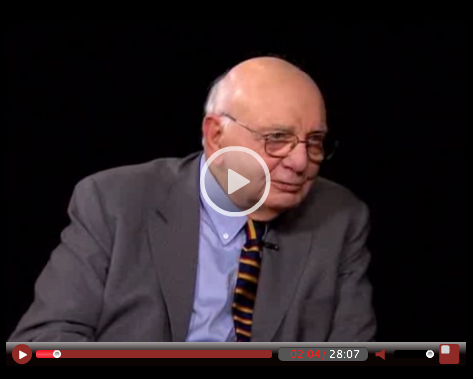Below are key excerpts from the interview piece
ON THE VOLCKER RULE:
CHARLIE ROSE: So just tell me what you think has happened to what we knew of as the Volcker rule that you intended.
PAUL VOLCKER: Oh, I think it is ok. There’s a lot of commotion about the lengths of the rule and the commentary and all the rest. A lot of lawyers have spent a lot of time trying to pick holes in this thing and, of course, the regulators respond by trying to close the holes that they pick in it and you end up with presumably pretty cumbersome of paper. I don’t think that read it; the rule itself, the regulation itself is only 35 pages.
CHARLIE ROSE: But it is like 300 —
PAUL VOLCKER: 300, including commentary, rules for how you keep records — most of the banks are going to want to keep these records anyway — but the regulation itself is 35 pages.
CHARLIE ROSE: So if anybody argues that banks lobbied and had it diluted, in the words of the creator of the Volcker rule they simply got it wrong.
PAUL VOLCKER: They got it wrong in any broad sense. And that is why there is so much unhappiness, I think. They say it is too complicated we can’t do it.
ON IF CONSUMERS ARE SAFER UNDER DODD -FRANK:
CHARLIE ROSE: Will consumers and investors and the economy be safer because of Dodd-Frank? And because of financial reform enacted since Barack Obama became president.
PAUL VOLCKER: Yes. I mean my answer to that is unambiguously yes.
ON NEW AUTHORITIES TO MONITOR AND CONTRAIN RISK:
CHARLIE ROSE: You made a speech which Gretchen also took note of called “Three Years Later.” And you pointed out three things, you mentioned “too big to fail,” you believe that too big to fail is no longer an issue because of Dodd-Frank.
PAUL VOLCKER: Oh, it will be an issue, but Dodd-Frank attempts to deal with it.
CHARLIE ROSE: Attempts to deal with it.
PAUL VOLCKER: Well, and I hope successfully, particularly for nonbanks. There is no reason why we have to support those nonbanks under any kind of reasonable resolution process.
The big banks, boy, we hope they don’t get in trouble and that is the relevance of some of these others rules.
CHARLIE ROSE: Do you worry about what’s called shadow banking?
PAUL VOLCKER: Well, shadow banking and non banks —
CHARLIE ROSE: — and hedge funds and other financial powerhouses that are now engaging in some of the businesses that typically commercial banks did.
PAUL VOLCKER: Because of Dodd-Frank, they come under the overall surveillance of somebody.
CHARLIE ROSE: Right.
PAUL VOLCKER: And it actually provides authority for their capital requirements, to provide other authorities to supervise those institutions which didn’t exist before. So Dodd-Frank provides the authority for all this kind of stuff, which everybody almost says is necessary. And it takes a lot of words to stick them into law but it is there. So you have the resolution authority, you have the nonbank, the shadow banking thing. You’ve got the capital requirements. Those are major elements in Dodd-Frank.
ON THE NEED FOR BETTER REGULATION OF MARKETS:
CHARLIE ROSE: Do we have strong, alert regulators? Because we did not last time.
PAUL VOLCKER: I hope we have stronger and more alert regulators than we did ten years ago. I mean you couldn’t go through that experience without — there was this feeling that the market could take care of itself, that, you know, markets were efficient and people had perfect foresight, get together, you don’t have to worry about this kind of thing the way we used to.
CHARLIE ROSE: That was the view of your successor Alan Greenspan.
PAUL VOLCKER: Well, the view of a lot of people, I’m afraid. And I think it is kind of been a rude awakening that we just can’t count on all these things to be self-correcting.
CHARLIE ROSE: Markets will not self-correct by itself.
PAUL VOLCKER: They usually do but too frequently do not.
ON THE ECONOMIC IMPACT OF DODD-FRANK:
CHARLIE ROSE: Well, the banks also argue, as you know, that (Dodd-Frank) will reduce — it will restrict their economic growth.
PAUL VOLCKER: Well, they have some economic growth on a lot of trading. They made a lot of money and lost it all in a couple of years, so I think that is a two-way street. I don’t believe that.
CHARLIE ROSE: Capital requirements, you don’t think —
PAUL VOLCKER: I think it is supportive of economic growth; it is supportive of all economic growth. No question at all about that. I am talking about the Volcker rule now.
Source:
Paul Volcker on Charlie Rose
U.S. Department Of The Treasury, October 26, 2011



What's been said:
Discussions found on the web: